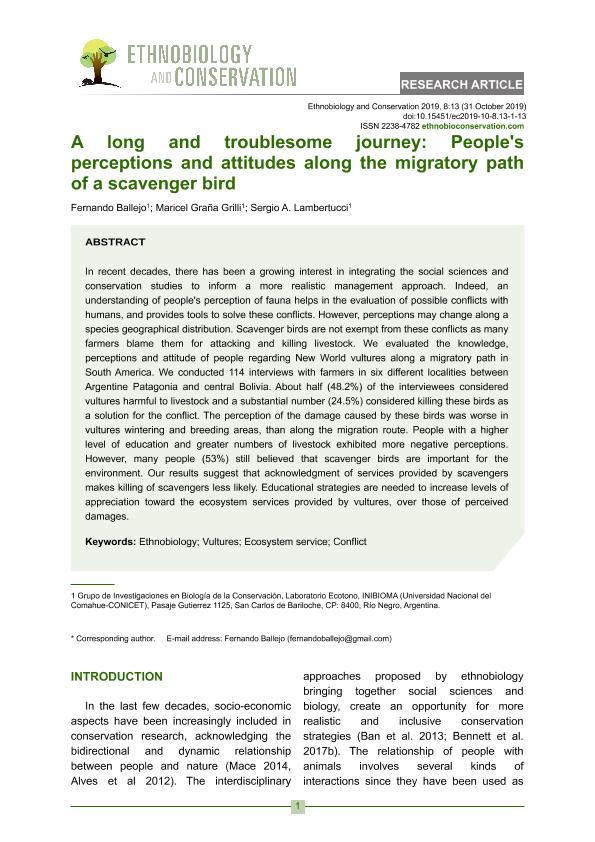Artículo
A long and troublesome journey: People's perceptions and attitudes along the migratory path of a scavenger bird
Fecha de publicación:
31/10/2019
Editorial:
Universidade Federal Rural de Pernambuco
Revista:
Ethnobiology and Conservation
ISSN:
2238-4782
Idioma:
Inglés
Tipo de recurso:
Artículo publicado
Clasificación temática:
Resumen
In recent decades, there has been a growing interest in integrating the social sciences and conservation studies to inform a more realistic management approach. Indeed, an understanding of people's perception of fauna helps in the evaluation of possible conflicts with humans, and provides tools to solve these conflicts. However, perceptions may change along a species geographical distribution. Scavenger birds are not exempt from these conflicts as many farmers blame them for attacking and killing livestock. We evaluated the knowledge, perceptions and attitude of people regarding New World vultures along a migratory path in South America. We conducted 114 interviews with farmers in six different localities between Argentine Patagonia and central Bolivia. About half (48.2%) of the interviewees considered vultures harmful to livestock and a substantial number (24.5%) considered killing these birds as a solution for the conflict. The perception of the damage caused by these birds was worse in vultures wintering and breeding areas, than along the migration route. People with a higher level of education and greater numbers of livestock exhibited more negative perceptions. However, many people (53%) still believed that scavenger birds are important for the environment. Our results suggest that acknowledgment of services provided by scavengers makes killing of scavengers less likely. Educational strategies are needed to increase levels of appreciation toward the ecosystem services provided by vultures, over those of perceived damages.
Palabras clave:
CONFLICT
,
ECOSYSTEM SERVICE
,
ETHNOBIOLOGY
,
VULTURES
Archivos asociados
Licencia
Identificadores
Colecciones
Articulos(INIBIOMA)
Articulos de INST. DE INVEST.EN BIODIVERSIDAD Y MEDIOAMBIENTE
Articulos de INST. DE INVEST.EN BIODIVERSIDAD Y MEDIOAMBIENTE
Citación
Ballejo, Fernando; Graña Grilli, Maricel; Lambertucci, Sergio Agustin; A long and troublesome journey: People's perceptions and attitudes along the migratory path of a scavenger bird; Universidade Federal Rural de Pernambuco; Ethnobiology and Conservation; 8; 31-10-2019; 1-13
Compartir
Altmétricas




